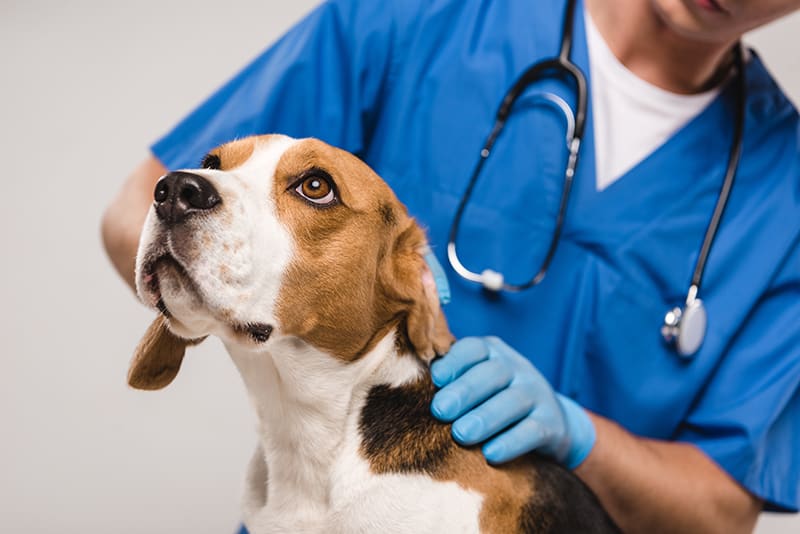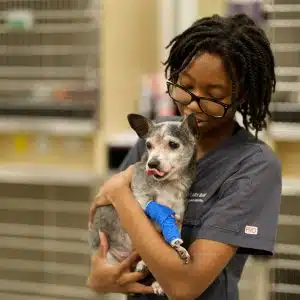Veterinary Oncology Services versus primary veterinary care for cancer patients
Wiki Article
The Importance of Very Early Detection: Insights From a Veterinary Oncologist
Early detection of cancer cells in pets is an important topic for family pet proprietors and vet professionals alike. Veterinary oncologists stress the value of identifying refined indicators that may show severe health and wellness issues. Typical signs typically go unnoticed till they intensify. Understanding these early caution indicators and advancements in analysis strategies can make a considerable distinction. What actions can family pet proprietors require to enhance their pet dogs' chances of early diagnosis and better therapy outcomes?Recognizing Cancer in Family Pets: Common Kinds and Symptoms
While several animal proprietors may not recognize it, cancer cells is a substantial health and wellness concern influencing pets, just like it performs in humans. Typical kinds of cancer cells in pets include lymphoma, pole cell tumors, osteosarcoma, and mammary growths. These malignancies can manifest in different means, relying on their place and kind. Signs and symptoms often consist of inexplicable weight-loss, consistent throwing up, changes in cravings, or unusual lumps and bumps. Animals might additionally exhibit lethargy, difficulty breathing, or unwillingness to workout, which can show underlying health concerns. Early signs can be subtle, making it necessary for family pet owners to be observant of their family pets' actions and physical problem. Recognizing these common types and linked signs and symptoms can encourage proprietors to seek vet treatment promptly, possibly leading to earlier diagnosis and treatment choices. Acknowledging the signs of cancer cells in pets is a vital step towards improving their health and lifestyle.The Duty of Vet Oncologists in Very Early Discovery
Vet oncologists play an important role in the early detection of cancer in animals, as their specialized training equips them with the skills needed to recognize refined indications that might be overlooked by general specialists. They utilize a combination of clinical know-how and progressed analysis devices to examine individuals completely - Board Certified Veterinary Oncologist. By recognizing early symptoms and threat aspects, oncologists can direct family pet owners towards timely interventions, enhancing the chances of effective treatmentMoreover, vet oncologists commonly collaborate with basic professionals to establish screening protocols customized to specific types or age groups, boosting the efficiency of early discovery efforts. They enlighten animal proprietors on the significance of normal exams and awareness of adjustments in behavior or physical problem. With these aggressive steps, vet oncologists significantly add to boosting end results for pets identified with cancer cells, highlighting the vital nature of their duty in veterinary health care.
Advances in Diagnostic Techniques for Pet Dog Cancer
Advancements in diagnostic strategies have noticeably boosted the capacity to spot cancer cells in family pets at earlier phases. Techniques such as sophisticated imaging, consisting of MRI and CT scans, supply thorough inner sights, permitting vets to determine growths that may not be palpable. Furthermore, the advancement of minimally invasive procedures, such as great needle aspirates and biopsies, enables exact tasting of cells for histopathological assessment with decreased tension for the animal.Emerging molecular diagnostics, including genetic screening and biomarker identification, are changing the landscape of veterinary oncology. These methods can identify particular cancer types and forecast reactions to treatment, helping with customized treatment strategies. Advancements in research laboratory methods, such as fluid biopsies, are starting to offer non-invasive alternatives for monitoring lump development and treatment efficacy. Jointly, these developments represent a significant jump ahead in vet medicine, stressing the essential function of very early detection in boosting results for pet dogs identified with cancer cells.
Exactly How Pet Dog Owners Can Acknowledge Caution Signs
Just how can pet proprietors become vigilant in recognizing prospective caution signs of cancer? Recognition of behavior and physical modifications in pets is important. Usual signs consist of uncommon lethargy, loss of hunger, or abrupt weight changes. Family pet proprietors should likewise focus on persistent vomiting or diarrhea, which might signify underlying problems.Modifications in the skin, such as swellings, bumps, or sores that do not pop over to this site recover, require prompt veterinary interest. In addition, owners should note changes in drinking routines, enhanced urination, or problem in breathing. Unexplained limping or discomfort may likewise be indications of even more significant problems.
Normal vet check-ups can help identify these indication early. By preserving a close monitoring of their pets' health and habits, owners can play an essential function in early detection, potentially resulting in much better results ought to cancer be diagnosed. Recognizing these signs may significantly impact an animal's quality of life.
The Impact of Early Discovery on Therapy Results
Early detection of cancer in pets plays a vital role in determining therapy end results, as it commonly enables a broader variety of healing choices. When cancer is detected in its beginning, vets can carry out much less intrusive therapies, enhancing the possibility of successful treatment. Early-stage cancers might additionally respond far better to radiation treatment or radiation, leading to improved survival prices and general quality of life for the animal.Furthermore, prompt diagnosis helps with an extra tailored therapy plan, straightening with the certain needs of the pet. This can consist of personalized drug regimens or medical treatments that are less hostile. On the other hand, late-stage discovery commonly leads to limited choices, much more aggressive therapies, and poorer prognoses. The value of early detection can not be overstated; it essentially modifies the trajectory of therapy, making it vital for family pet owners to stay cautious for any indicators of disease in their cherished friends.
Regularly Asked Concerns

Just How Can Diet Impact Cancer Danger in Pets?
Diet regimen significantly affects cancer danger in pets, as specific nutrients and food kinds can either promote or inhibit tumor growth. A well balanced, nutrient-rich diet might help minimize the likelihood of establishing cancer cells in animals.
Are Specific Types More Prone to Cancer?
Particular dog breeds, such as Golden Retrievers and Martials artists, exhibit higher cancer cells sensitivity because of hereditary predispositions. Some feline breeds likewise reveal raised cancer dangers, highlighting the relevance of breed-specific health awareness among animal proprietors.
What Are the Expenses Connected With Early Cancer Cells Discovery?
The costs related to very early cancer cells discovery can differ considerably, encompassing diagnostic tests, appointments, and prospective treatments - Veterinary Oncology Services. Purchasing these services commonly leads to better health and wellness end results, ultimately reducing a lot more considerable future medical expensesCan Injections Protect Against Cancer Cells in Pets?


Vaccinations might reduce the danger of particular cancers cells in pet dogs, especially those linked to viral infections. Nevertheless, their performance differs, and pet dog owners ought to consult vets for customized advice concerning inoculation and cancer cells avoidance approaches.
Exactly How Typically Should Pet Dogs Be Evaluated for Cancer cells?
Pet dogs need to generally be screened for cancer cells annually, especially as they age or if they exhibit risk factors. Regular veterinary check-ups can help identify possible concerns early, boosting therapy end results and general health and here are the findings wellness administration.Early detection of cancer in animals is an important topic for pet owners More hints and vet professionals alike. Early signs can be refined, making it essential for pet owners to be observant of their pets' behaviors and physical condition. Veterinary oncologists play an essential duty in the very early detection of cancer in pet dogs, as their specialized training equips them with the abilities needed to determine subtle signs that may be neglected by basic experts. By preserving a close monitoring of their family pets' health and habits, proprietors can play a crucial role in very early detection, possibly leading to far better results should cancer cells be detected. Early discovery of cancer in pets plays an essential duty in identifying therapy results, as it frequently enables for a wider array of therapeutic options.
Report this wiki page